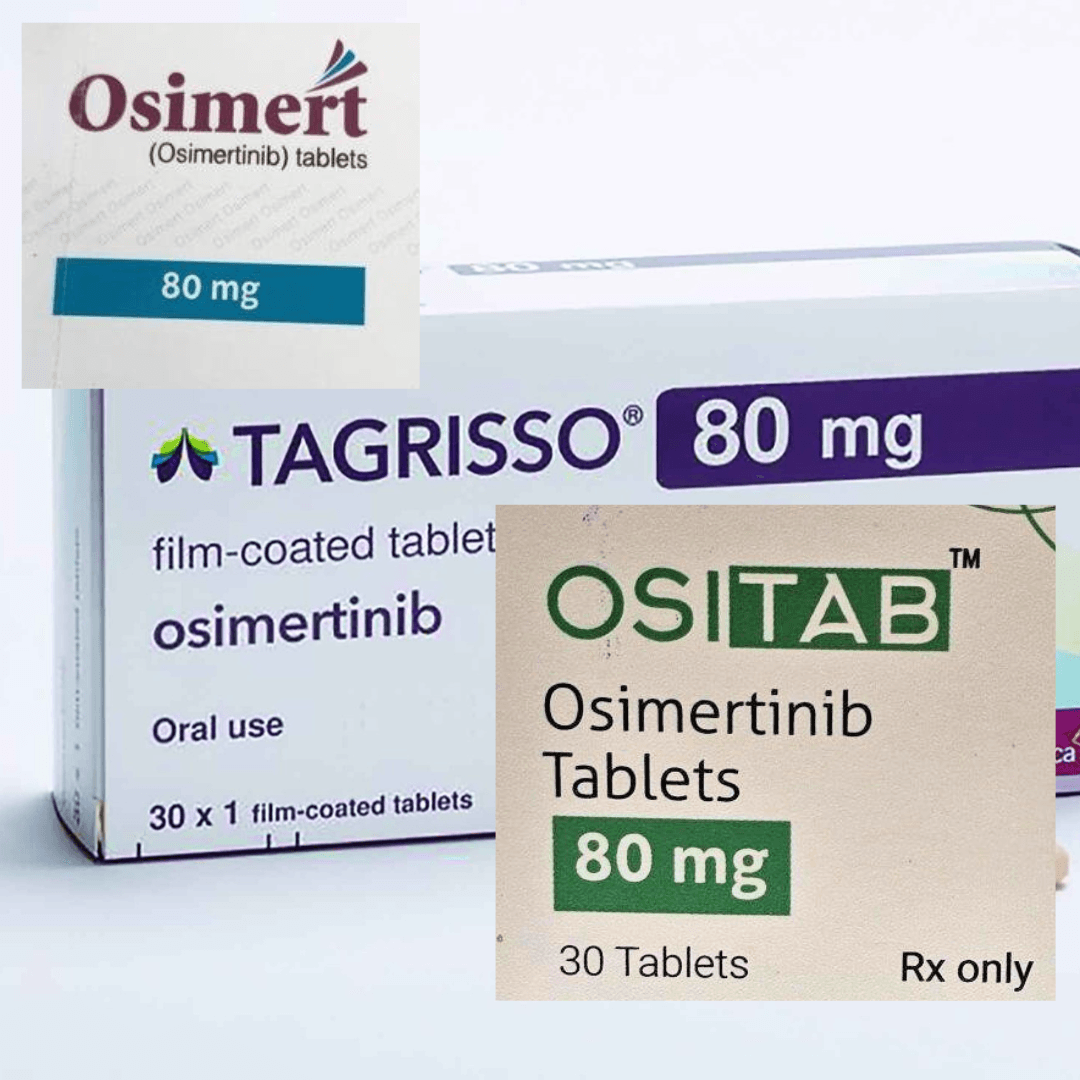Introduction
- Generic Name: Osimertinib
- Common Brand Names: Tagrisso, Ositab, Osimert
- Strength: 80 mg tablet
- Drug Class: Third-generation EGFR tyrosine kinase inhibitor (EGFR-TKI)
- Indication: Non-small cell lung cancer (NSCLC) with EGFR mutation
Osimertinib is an oral anticancer medication used in the targeted treatment of certain types of advanced lung cancer, specifically non-small cell lung cancer (NSCLC) with EGFR gene mutations, including T790M resistance mutation.
What Is Osimertinib Used For?
Osimertinib is approved for:
✅ First-Line Treatment of NSCLC
- For patients with locally advanced or metastatic NSCLC with EGFR exon 19 deletion or exon 21 (L858R) substitution mutations
✅ Second-Line Treatment
- For patients who developed the T790M resistance mutation after progression on earlier EGFR-TKI therapy
✅ Adjuvant Therapy
- For patients with early-stage EGFR-mutated NSCLC after complete tumor resection
How Osimertinib Works
Osimertinib is a third-generation EGFR inhibitor that selectively targets both activating EGFR mutations and the resistance mutation T790M, which is often responsible for disease progression in patients treated with earlier EGFR inhibitors.
- It blocks EGFR signaling that promotes cancer cell growth
- It is more selective and less toxic to normal cells
- Effective in treating brain metastases due to its ability to cross the blood-brain barrier
Dosage & Administration
- Standard Dose: 80 mg once daily (with or without food)
- Route: Oral
- Duration: Continued until disease progression or unacceptable toxicity
Tablets should be swallowed whole, not crushed or split.
Available Osimertinib Brands
✅ Tagrisso 80 mg Tablet
Originator brand by AstraZeneca
✅ Ositab 80 mg Tablet
Generic osimertinib formulation
✅ Osimert 80 mg Tablet
Alternative generic brand available for affordability
Side Effects & Safety
Common Side Effects:
- Diarrhea
- Rash or dry skin
- Nail changes
- Cough
- Decreased appetite
Serious Side Effects (Seek Immediate Help):
- Interstitial lung disease (ILD)
- QT prolongation (heart rhythm changes)
- Cardiomyopathy
- Eye inflammation
- Severe neutropenia
Precautions & Warnings
- Avoid during pregnancy – may harm unborn baby
- Caution in patients with heart disease
- Monitor ECG and electrolytes during treatment
- Do not use with strong CYP3A inducers (e.g., rifampin)
Drug Interactions
Avoid co-administration with:
- CYP3A4 inducers/inhibitors
- St. John’s Wort
- Grapefruit juice (may increase toxicity)
Always inform your doctor about any other medications or supplements.
Monitoring Requirements
Patients on osimertinib require regular:
- Lung function tests
- ECG monitoring
- Liver function tests
- Blood counts (due to neutropenia risk)
FAQs About Osimertinib
Q: How long can patients stay on osimertinib?
A: As long as it remains effective and is well-tolerated. Some patients benefit for several years.
Q: Can osimertinib treat brain metastases?
A: Yes, it crosses the blood-brain barrier and is effective for CNS involvement.
Q: Is osimertinib a chemotherapy drug?
A: No, it’s a targeted therapy, not a traditional chemotherapy.
Q: Does it require genetic testing?
A: Yes. It’s essential to confirm EGFR mutation status before starting treatment.
Q: Can osimertinib be taken with food?
A: Yes, it can be taken with or without meals.

